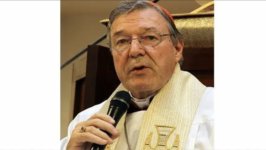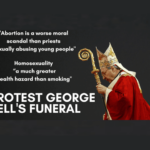Protesting Pell’s Legacy of Enabling Child Sex Offences

As George Pell’s body lays in state at St Mary’s Cathedral in Sydney in preparation today’s mass, there are tens of thousands of ribbons being tied to fences surrounding the church.
The ribbons are intended as a reminder of those who suffered sexual abuse as children by Catholic priests.
The Church keeps removing the ribbons. It’s a small act, but a defiant one at a time when emotions are running high.
And, for many Australians, it is this kind of arrogance and defiance that sums up the Catholic Church’s continued response to the collective voice of victims of child sexual abuse, which seems to suggest the Church wants to pretend these victims don’t exist.
George Pell’s controversial legacy
George Pell, who was acquitted of child sexual abuse charges, still casts a dark and controversial shadow, even in death. Because even if he was found not guilty og the child sexual abuse charges against him, he still knew of child abuse within the church and did nothing to stop it.
The Royal Commission into Child Sexual Abuse, after a 5-year long inquiry, tallied more than 1,800 Catholic Church figures allegedly involved in child abuse 4,444 allegations of abuse.
The redacted parts of it’s final report released by the Commission in 2020 after George Pell’s acquittal, revealed that the Commission’s investigations into George Pell found that he knew about child abuse occuring within the Church as early as the 1970s.
Pell was aware of child sexual abuse within the Church
Specifically, the Commission found, George Pell knew of the offending by Gerard Ridsdale who committed more than 130 offences against children as young as four between the 1960s and 1980s while working as a school chaplain. In fact, George Pell accompanied Gerard Risdale to court in 1993, and offered to provide character evidence for him.
The Commission also determined that George Pell also knew of the offending by Brother Edward “Ted” Dowlan who was convicted of 42 counts of child sex offences between 1971 and 1985, and did not act upon what he knew.
The Catholic Church programme that George Pell set up as the Church’s response to victims of child sexual abuse has been repeatedly criticised over the years for it’s lack of compassion in dealing with victims – essentially it paid victims paltry capped sums of ‘hush’ money in exchange for silence. Victims say the Church was more concerned about the ‘gossip’ that would surface, rather than the trauma that had been experienced by victims.
In 2019 it was revealed that between 1996 (when the scheme was set up) and March 2014, the archdiocese spent $34.27 million to administer and manage the Melbourne Response, with only $9.72 million – less than 30 percent – used to compensate 307 child sex abuse victims.
Law reform designed to help victims
Since the Royal Commission, governments around Australia have made law reforms to make it easier for victims to access compensation.
For example, until recently, the Catholic Church was essentially immune from civil liability for criminal offences committed by members of its clergy. This was known as the ‘Ellis Defence’, and it prevented victims from suing unincorporated organisations such as Churches.
But recent changes to the law in a number of Australian jurisdictions, including in Victoria and New South Wales, have paved the way for victims to claim damages against unincorporated organisations if it can be established there was a breach of the duty of care the body owed to a person who was abused, and the breach led to harm.
In New South Wales, laws were passed in 2022, which allow courts to break unfair settlements and ‘gag orders’ placed on victims of child sexual abuse.
Queensland passed laws in 2002 which make it a crime for priests to fail to report incidents of child sexual abuse. Under the laws, religious institutions and their members are no longer able to use the sanctity of confession as a defence against failing to report material information about the sexual abuse of children. The laws also apply to information received in the past – a significant win for victims of historic sexual abuse. Those who fail or neglect to report such conduct will be liable to a maximum penalty of three years in prison.
Why does the Catholic Church keep treating victims with disdain?
But even with new legal frameworks which are designed to make the legal process easier for victim survivors, many are still finding themselves frustrated by legal tactics and loopholes being used by the Catholic Church to delay hearings, or to stall the justice process.
It’s difficult to understand what continues to motivate the Church’s disregard for the damage that it has caused. Over the past several years, not just in Australia, but around the world, evidence of systemic abuse of children and nuns by CAtholic priests and a culture of secrecy and cover-up has all but ruined the Catholic Church’s reputation, with disillusioned followers abandoning the religion in droves.
It’s not a question of affordability either – the Catholic Church is one of the wealthiest institutions in the world. According to figures released in 2018, the Catholic Church in Australia was worth $30 billion.
Pope Francis has delivered mixed messages with regard to the child abuse scandal that has engulfed the Church during his tenure. In some cases he has defrocked priests found guilty of child sexual abuse, at other times, he has claimed that the church is being persecuted.
The facts are clear – the issue of child sexual abuse by Catholic priests is very much out in the open, particularly since the Royal Commission and the high profile trial of George Pell.
Many priests are behind bars serving significant jail terms, there are numerous cases before the courts – both criminal and civil – in relation to child sexual abuse.
Tens of thousands of victim survivors exist and they must be acknowledged if justice, peace, and progress are ever going to be made.







